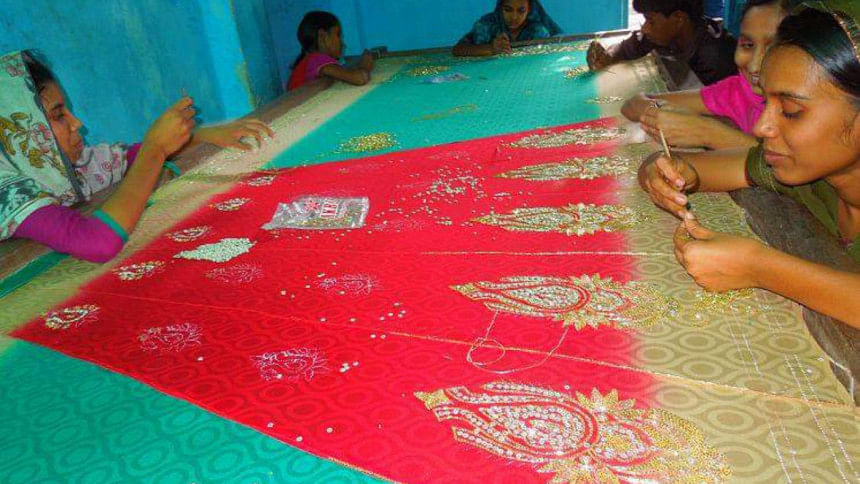Women make fancy designs on clothes for Eid market

Several thousand women in about 15 remote villages of the district are busy making artistic fancy works on saris, scarves, blouses, chemises and other clothes supplied by garment houses of the capital and other cities to make them attractive and pricey in the ongoing Eid market.
Visiting different villages like Neyamatpur, Dhelapeer, Golahat of Saidpur upazila, Tenganmari, Dundibari under Jaldhaka, Panchapukur, Kanial khata of Sadar upazila, this correspondent saw women and children of different families sitting at house yards making artistic designs on clothes.
They were doing works like embroidery, spangle and ornamental stitching using chumki, puti, jori, colour stones, lace etc.
Makers of these attractive designs, mostly widows and poor women, master the work through observation and practice.
"Village women do design on saris and other dresses by setting colourful glittering stones with sewing work. Traders in the capital and other big cities make good profits by selling the attractive dresses," said Abdul Hye, owner of Fancy Karchupi House in Nilphamari.
Gul Naz, a fancy designer of Dhelapur village said she does the work after finishing domestic chores and her nine-year-old daughter helps her in the work.
The women artisans get Tk 500-Tk 700 as wage for making designs on a sari, Tk 200-300 for a scarf and Tk 100-Tk 150 for a blouse, according to designs.
The seasonal income that stands up to Tk 4000 per head enables them to buy new dresses for family members and arrange good food on the Eid day, said several artisans.
Garments traders in the capital usually sell designed saris for Tk 5,000 to Tk 30,000 per piece, making good profit, sources said.
Several local garment traders including owners of Ruma Fashion, Saudia Handicraft, Champa Karchupi House, and Pappu Fashion usually coordinate between Dhaka-based traders and village artisans in this work.
Every day new orders are coming from different places and more women are getting involved in this seasonal trade.
The handiwork provides employment to thousands of poor women but its progress is hampered due to availability of Indian dresses with machine made design, said Anwar Hossain, district unit president of 'Karu shilpi samobai samity'.
The government should take steps to stop massive smuggling of Indian saris to promote local products, he said.

 For all latest news, follow The Daily Star's Google News channel.
For all latest news, follow The Daily Star's Google News channel. 



Comments